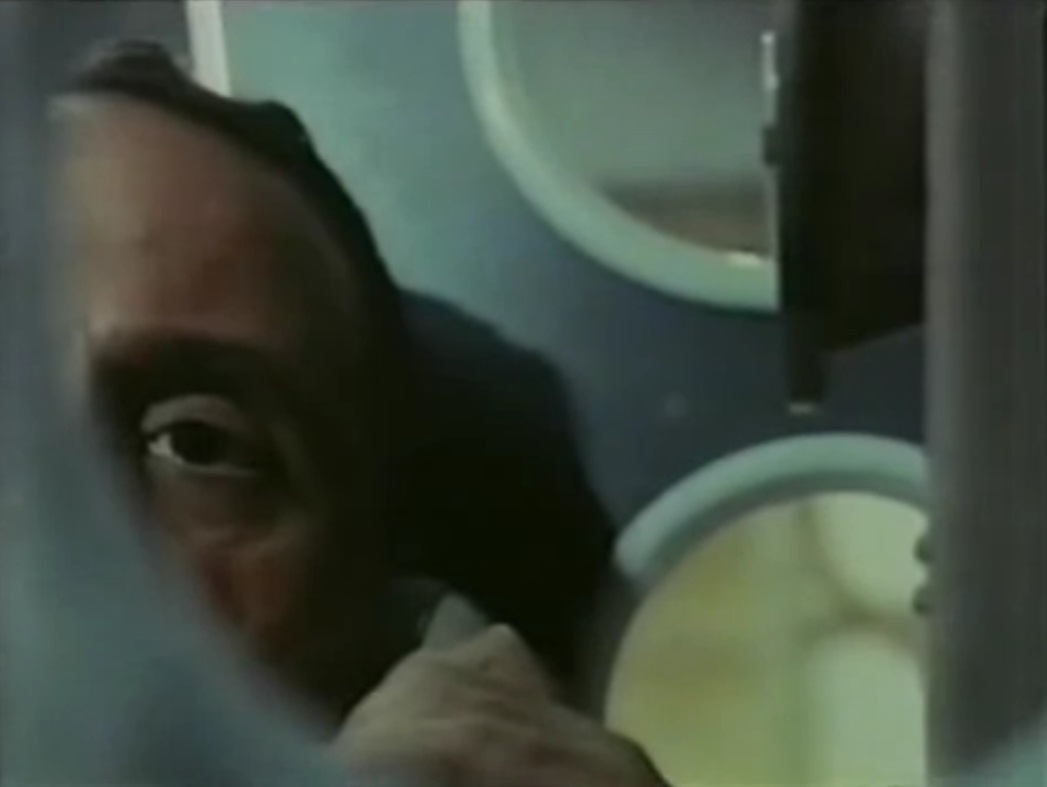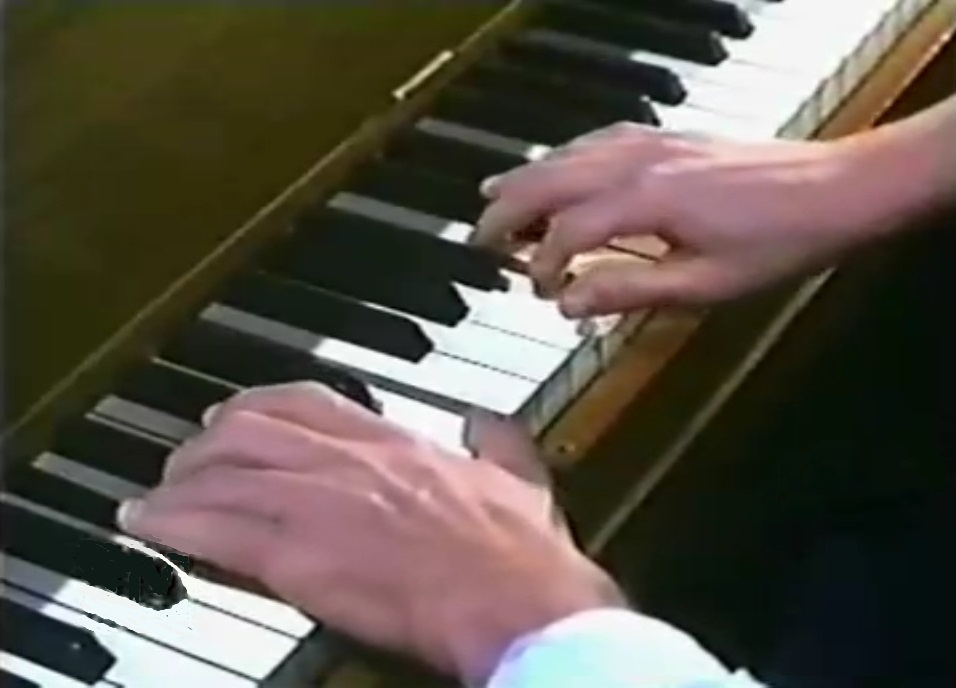The
Cupboard
Armchair Mystery Theatre
Two cupboards, but the title is right.
The Irish landlady who’s killed her husband in a drunken
rage and now is selling the boarding house to buy property in Bristol.
The wife who’s run away to Manchester with a garage
mechanic.
The latter’s husband, one of the boarders, has a plan for
papering these matters over.
Donald Pleasence, “now appearing in The Caretaker at the
Duchess Theatre”.
A Piano in the House
The Twilight Zone
Greene directs
this very brilliantly, as it is one of the most fearsome and brilliant
compositions in the series. Hamner has been to the city and seen a play, and
read the notices. This accounts for the terrible accuracy of his marksmanship.
The critic is a
cynic who knows the price of “creative workers”, as they are called
on occasion in this latter day, and has no idea what it is they do. They
frighten him in the dark, he lashes out.
The Shuttered Room
An extremely
precise nightmare vision, which is second sight (madness is logic, says Auden,
nightmare is precision), assuredly one of the great works of the cinema by
sheer dint of laborious accuracy in every detail, and finally the great
revelation that snaps the nightmare like a numb limb unclenched.
“Only 45
minutes from Broadway” in a gold Thunderbird convertible, a “pretty
car”, among the derelicts of a “cursed” family near the
seaside in a Godforgotten settlement ahead of Peckinpah’s Straw Dogs
with even less of civility, at the dead center of which is ”the hot
breath of Hell” pent up so many years.
The studio is
Twickenham nonetheless, the great cast are put through their paces, no pains
are spared, a fine jazz score accompanies the
cinematography.
Saturday
Coronet Blue

To THe SEArcHIng i
and its proprietor straight out of Johnny
Staccato, a call from The Ginger Man. Two thousand bucks at Lincoln Center
Plaza for the real Michael Alden (great work by Greene on location). Mister Buddwing’s (Delbert Mann) Central
Park, where the theme splits, adding a young lad sought by friends on his
mother’s behalf, his father has died (the boys are seen arguing over a
sidewalk game as Alden runs through the shot, pursued by men with pistols and
silencers), “there isn’t
any Saturday any more. Not any.” Beckett’s “samedi répit”.
Full of stuff, the kid. “I can’t take
over the house!” Saw a baby born, on television, “gettin’ loose”. Life in the park, the scenes
omitted from Beckett’s Film
(dir. Alan Schneider), cf.
Maté’s D.O.A. (faces, children,
ball). “Wal-ter, Wal-ter, it’s time to come home,” like the
muezzin-cries in Hitchcock’s The
Man Who Knew Too Much reprise. The kid has stories, Michael Alden’s
life on the Wabash, etc.
Terence Young’s Wait Until Dark three months later has the man in the car on the
lot beside the chain link fence on 64th Street biding his time. Death by
misadventure cancels the deal, Alden tells the story of Coronet Blue to the
kid, who isn’t much impressed, “you’d feel awful sorry for
yourself—you know, if it were true.”
“I—brood a little,” Alden
concedes humorously, still...
“I know what you mean,” says the kid
restored to his family’s bosom as its head, “but that’s
life!”
Six Months to Mars
Coronet Blue

“Well,
now, just how important is he?”
“It’s
top priority. Urgent.”
“Yeah,
well, every assignment is urgent.”
“I’m
not inclined to discuss priorities with you, just find the boy! The amnesia may
not last indefinitely.”
The enchanting
image of two hands male and female on the keys of a piano in Mozart (cf. Petri’s L’assassino, Godard’s
Détective),
out of the frenzy and fascination of go-go dancing. “Simple little tunes
by Mozart can be deceptive.” Patrick O’Neal as “the director
of Perkins Research Institute” (he introduces “Dr. Ross of our Psychiatric
Department”) the year after Kershner’s A Fine Madness, “a center for space research...
bioastronautics...”
Sebastian
The film about
code-breaking that left top critics (Variety, Roger Ebert of the Chicago
Sun-Times, and most hilariously Renata Adler of the New York Times)
without the slightest idea of its meaning, but entirely convinced there is no
meaning at all to be found, vehemently so.
The top code man
and his bright young things in London decipher enemy spy codes and foreign
dispatches and satellite communications, he’s left Oxford for this and is
near a breakdown, one of the girls takes him in hand, away from his Saturday
mistress the pop queen (“silly bitch,” says the latter, seeing
herself on the telly critiquing some new act). An old hand at the office with a
“burning Jewish heart” and memories of World War II has no stomach
for the Cold War and breaks security over the Americans in Latin America.
The pop queen is
bullied by the opposition into setting up her lover for a hallucinogenic
suicide, a near thing prevented by M.I.5.
The girl in cryptography gets a son by him
and quits the business, she finds him “fascinating”, the rest is
secondary, the baby’s rattle gives him a clue to the complex Sputnik code
he’s working on, reconnaissance from Earth orbit, it’s a bit of
inspiration really, something critics had better seek out, as far as possible.
Exceptionally fine wit on the subject of analysis
at a particularly critical time is what the film is made of, it bears the
imprimatur of Michael Powell as producer, has Dirk Bogarde and Susannah York
with Lilli Palmer and Nigel Davenport and John Gielgud and Janet Munro and
Ronald Fraser to express it, and is a very serious comedy, which must have
perplexed the experts for that very reason (cp. David Lean’s This
Happy Breed, however, for a clue).
The Adventure of Auld
Lang Syne
Ellery Queen
The main inspiration
is the banquet speech in The Best Years of Our Lives, as noted in the
cabbie’s remark on his flat tire made of synthetic rubber (“if
we’d had these on Normandy...”). A wealthy industrialist is
murdered on New Year’s Eve, 1946, the suspects are the heirs he
vituperates and promises to disinherit before 1947. It’s not the
successor, the climbing bimbo, the petty-cash swindler, the secretary, nor her
draft-dodging fiancé, it’s the swimming-pool salesman.
Greene negotiates
the lighting system into a demi-noir on tightly accurate set-dressing and
costumes, and gives the players leeway to accomplish their remarkable turns one
after another, among them the voice of Barbara Rush emanating from an artfully
plain secretary.
Inspector Queen
has all this on his shoulders until Ellery finally arrives and solves the case
almost at once. The range of suspects includes city and state officials
impatient to be released from the crime scene at the Hotel Astor.
The Trial of Lee Harvey
Oswald
Last moments of the trial, flashbacks to Russia, New Orleans,
Texas, Mexico City, the trial itself, evidence, witnesses (dwindling for the
defense counsel), President Johnson’s opposition to any idea of
conspiracy, FBI contacts, curtain rods that may have existed, Oswald’s
denial of even having owned a rifle, etc.
The defense
uncovers evidence of a CIA plan using the Mafia to assassinate Castro, failing
this Oswald was made a patsy in Dallas, for a more anti-Castro president, it
argues, acknowledging the failure of that plan as well. Omertà is the
signal feature.
The prosecution
alleges personal jealousy provoking a psychological disturbance caused by the
President’s appearance on television the night before, occupying Mrs.
Oswald’s attention and finally determining the act.
Jack Ruby has the
last word.
A superb film,
led by Ben Gazzara as the prosecutor and Lorne Greene as the defense counsel.
Gray Lady Down
Charlton Heston is a great and beautiful actor. He painted the
Sistine Chapel as Michelangelo in The Agony and the Ecstasy, and here at
a moment of crisis enters his submarine cabin, sits down and looks like a
harrowed soul in The Last Judgment.
With due respect to the unlearned critics, Gray Lady Down
is somewhat underproduced, which forces Greene’s hand more than he would
prefer. He cagily engages the most pure and precise techniques around and gives
them room to operate. David Carradine invents a character for the experimental
sub captain, an unforgettable thing from a few gestures and expressions. Stacy
Keach looks another person as he tries to convey not a stock person but a Navy
man on the bridge in functional circumstances (there’s more than enough
drama in that). Ronny Cox and Ned Beatty shift down from Deliverance,
Charles Cioffi has the relay task of carrying the title, and the rest of the
acting (which is almost entirely what this picture comprises) is a bariolage of
delineations.
Incidentally, “Gray Lady” as a venerable term for a
venerable newspaper was perhaps last heard just before the Los Angeles Times
was sold to the owners of the Chicago Tribune in the Nineties.
Carradine’s final move is a speculation, the last shot is
a telling transformation achieved in a continuous take. Greene’s main
accomplishment is to have acquired Countdown’s (Robert Altman)
sense of fear in the natural environment.
Vanishing Act
Authentic delicatessen in the “boonies” (it has to
be flown in) versus the new wife who is not she, not at all.
Question of an inheritance, question of murder, by Link &
Levinson out of Robert Thomas’ play.
Filmed in Banff, but set high up in one of the Rocky Mountain
states.
Inherit the Wind
There’s a way in which the Bible is mocked for its
incongruities, never more senselessly than by some of its adherents, who
forsake the wisdom God gave them. Seeing, they do not see, hearing, they do not
hear. They seek not, and therefore do not find.
This irreligioisity in its brutal mask of piety or atheism makes
martyrs, two of whom are portrayed here, the evolutionist undergoing
Galileo’s inquisition, and the priest of the Lord who bears false witness
to an idol of received wisdom.
The man of science in backward places is not infrequently seen
as a witch doctor of sorts, precisely as the man of religion is, since the
requisite understanding is lacking in those around him, hence there is a third member
of the cast, Darren McGavin as the reporter Hornbeck, who sticks his
thoughtless nose between Jason Robards as Henry Drummond the great legal mind
of the day, and Kirk Douglas as the presidential candidate and revivalist
Matthew Harrison Brady.
The sharp direction proceeds apace with no time for reflection,
just the sharp collision of its ideas settling as much as can be settled in a
thronging courtroom somewhere in small-town America. “I want to bring
this country back to God,” says Brady. “I didn’t know He
left,” replies Drummond.